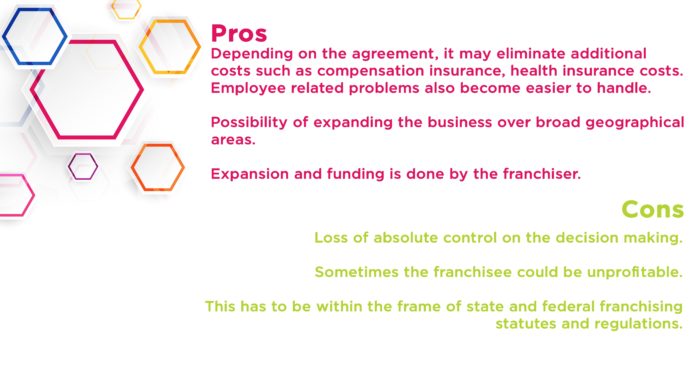When you step into the world of business, you will have an understanding of the direction you want to go in, but there is so much that needs to be considered before you take that first crucial step. As an entrepreneur, you can start a business of your own, gradually setting it up from scratch. You can also acquire an existing business or make an investment that makes you a shareholder. Another way of starting a business is franchising, which has its own pros and cons. In this article, let’s have a look at how you can go about a decision of owning and operating a franchise.
When looking at what Franchising is, we can define it as an exclusive right conferred by the parent organization to an individual or enterprise to use the parent’s business model, in stipulated areas. It is also a business relationship; wherein the owner authorizes another party to use their brand, product, business system and process in return for adequate consideration.
The key to success when it comes to getting hold of a franchise is finding one with a perfect balance between your passions and business profitability. This is clearly a challenge but it can be overcome by carefully examining the many options and the dynamics they each present.
So, What Happens in a Franchise Model?
Basically, franchising is a means through which products and services are distributed. There are at least two levels of people involved in a franchise; the franchiser and the franchisee. The franchiser is the one who establishes the brand’s trademark/trademark name and a business system. The franchisee is the one who pays a royalty and/or initial fee, gaining the right to carry out business under the franchiser’s name and system.
Therefore, when you buy a franchise, you are also buying the right to use a specific trademark and/or business concept. You have to remember that the business you run is the same as all the other businesses being run under the same name. It is likely that you will need to buy things like products, tools, advertising assistance and training from the franchiser – these are things they have developed to add value to and enable your operation.
Once the franchise is under your ownership, its operations will be run under the terms of the franchise agreement. This is seen as the main benefit of franchising; the ability to capitalize on the business format, trade name and support system provided by the franchiser. If we take a look at some familiar brands like KFC, McDonald’s, Taco Bell and Burger King, they are all franchises that are operating in Sri Lanka and in many other countries. Have you ever wondered who the local franchisees are? Or most importantly, did you know that these were franchises?
Buying a Franchise
Let’s look at the pros and cons of entering a franchised business. As lucrative as it may look, it could also have a down side, especially for those who lack business acumen.

Hence, it is a fact that the major pros are that the assistance you receive from the mother company and the success rate of the franchisee is mostly based on the franchiser’s reputation and the market opportunities available. Speaking of the latter, it is a regular practice for global giants that follow franchising models to let their local franchisees customize the offerings to suit the respective localities. Sometimes, this would be the key to enter and penetrate the market as well as to be competitive with local counterparts. Think of your favorite McRice at McDonald’s or the Birizza at Pizza Hut, which are definitely not on the menu in other countries.
However, it could also be hard being a franchisee, due to how bound you are to the mother company, which probably gives you no control over your own business, and your own name is associated very little with the brand. As an example, if the franchiser adopts some new practices or a new branding theme for the global operation, you have no option but to follow. Based on the agreement, such changes could cost you a thumping amount of money.
What are the Documents that you have to be aware of?
When buying a franchise, it is vital that you go through and secure all necessary documents. The following are some such documents.
- Operations Manual(s)
- Training Programmes
- Legal Documentation – Franchise Contract and Franchise Offering Circular
- Franchise Marketing Material – Brochures, Applications, Press Releases and Web Pages
- Franchise Operations Manual
- Franchise Registration Application(s)
- Franchiser’s Brand Guidelines
Before you sign a Franchise Agreement, there is a lot of information that you must gather. Needless to say, you must first do a thorough background check of the franchiser. Read and analyze all the documents listed above and any other relevant documents you can gather. Before signing the Franchise Agreement, cross-check everything that appears on it. Additionally, do not forget to seek the advice of a lawyer, business advisor and an accountant who are experienced in franchising and contract law.
Becoming a franchisee of a well-known brand could be an easy path to success with all the steps mapped out for you, and much of your budget mapped out for you. What you give up might be the freedom to make independent decisions, and you could end up with major financial commitments that you have to meet no matter what. Whether you want to become a franchise operator will depend very much on your appetite for risk, as well as your appetite for undertaking to come up with all the systems and processes – or get them all (at a cost) from someone who is already operating them very profitably elsewhere.





